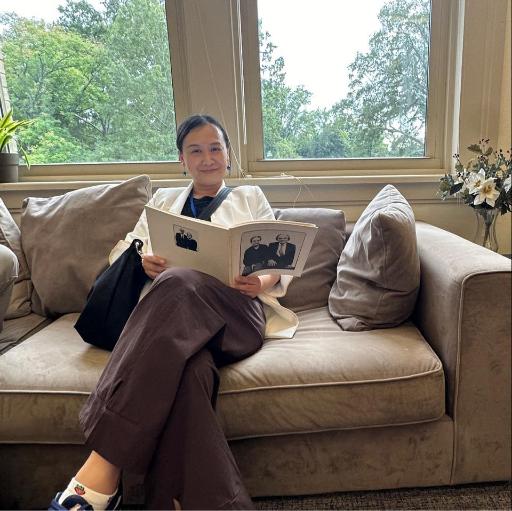
Dr. Jing Iris Hu, Department of Philosophy
- Associate Professor, Philosophy
Are you the profile owner?
Sign in to editResearch areas: Ethics, Moral Psychology, Confucian Philosophy
Contact information
Email:
Availability:
Website:
Biography
Education
Ph.D.: Duke University, North Carolina (2017)
I am an Associate Professor of Philosophy at Concordia University in Montreal, Canada. My work focuses on moral emotions such as sympathy, shame, and their roles in moral communities. I am particularly interested in understanding the role emotions play in moral deliberation, moral motivation, and moral learning in Chinese philosophy and moral psychology. Currently, I am working on a monograph on shame and self-awareness in Early Chinese Thoughts. For the fall of 2024, I am a visiting scholar at the Sage School of Philosophy at Cornell University.
My work has appeared in journals such as The Journal of American Philosophical Association, Hypatia, Dao, Philosophy Compass, Comparative and Continental Philosophy, and the Journal of Chinese Philosophy. Here is an article in the Guardian in which I was interviewed to discuss the complexity of the Confucian idea of shame; here is a story on the Global and Mail on my study on the cultivation and expression of emotions in public lives.
Besides my research, I do freelance translation on topics that interest me. For example, my translation of Neil Gaiman's Norse Mythology is one of the most popular books on amazon.cn in 2019 in China.
Teaching activities
2022 Fall -2023 Winter (on leave)
2021 Fall -2022 Winter
PHIL 280 Classical Chinese Philosophy
PHIL235 Biomedical Ethics
PHIL 430 Advanced Studies in Ethics
PHIL 235 Biomedical Ethics
Fall 2020-21
PHIL 380 Chinese Philosophy: From Han to the 19th Century
PHIL 235 Biomedical Ethics
Winter 2019-20
PHIL 235 Biomedical Ethics
Fall 2019-20
PHIL 285 - Non-Western Philosophy
PHIL 430 - Advanced Studies in Ethics
Publications
Learned Women, “Leftover” Women, and “The Third Sex” — Women’s Learning in the Confucian Tradition and Contemporary China, Hypatia: A Journal of Feminist Philosophy, Forthcoming (accepted Aug. 2023) Wordcount: 10,040, peer-reviewed. Open Access Link
Roles and Virtues: which is more important for Confucian Women? forthcoming, in Alex Barber & Sean Cordell ed., Ethics of Social Roles, Oxford University Press, 2022. Link.
Shame, Vulnerability, and Change, 2022, The Journal of American Philosophical Association. 8(2), 373-390. Open Access Link.
The Mencian Triplet of Ceyin Zhi Xin: Perceptive, Affective, and Motivational, in Dao Companion to the Philosophy of Mencius (2023),
Springer. Editor: Yang Xiao, Kim-Chong Chong ed.
Confucian Ethics, BloomsburyHandbook in Ethics (2023), Bloomsbury Press. Editor: Christian Miller
Constructing Morality with Mengzi: Three Lessons on Moral Discovery and Meta-ethics, with S. Robertson, in Lost Voice at the Foundation of Ethics, Routledge. ed. Colin Marshal, (2020). Penultimate draft.
Moral Motivation in Mencius Part 1—When a child falls into a well, Philosophy Compass. 2019; 14:e12615. Link
Moral Motivation in Mencius Part 2—When one burst of anger brings peace to the world,” Philosophy Compass. 2019; 14:e12614. Link
Empathy for non-kin, the faraway, the unfamiliar, and the abstract—an interdisciplinary study on moral cultivation and a response to Prinz. Dao: A Journal of Comparative Philosophy. 2018. 17.3: 349-362. Link
Danvers A. F., Hu, J., and M. J. O’Neil (2018), “Emotional Congruence and Judgments of Honesty and Bias,” Collabra: Psychology, 4(1), 40. DOI: Link
Flanagan, O. & Hu, J. (2011). Han Fei Zi’s philosophical psychology: Human nature, scarcity, and the neo-Darwinian consensus. Journal of Chinese philosophy, 38(2), 293-316.
· Reprinted in J. D.Carlson & A. F. Russell, State of Nature in Comparative PoliticalThought: Western and Non-Western Perspectives (Chapter 2). LexingtonBooks.
Reviews:
The Wrong of Rudeness: Learning Modern Civility from Ancient Chinese Philosophy, Oxford University Press. Amy Olberding. Journal of Moral Philosophy (2022)19.6. 1660
Between Nature and Person: What the Neo-Confucian Wang Fuzhi Can Teach Us About Ecological Humanism, Comparative and Continental Philosophy. 2018;10.3. Link
"The Emotions in Early Chinese Philosophy." Australasian Journal of Philosophy, 97(2), pp. 421–422. Link
Participation activities
Talks and Presentations (selected)
War and Shame –A Debate on the Appropriate Response to Insults between the Confucians and their Interlocutors
-
Columbia Comparative Philosophy Seminar, September 15 2023, Room 716, Philosophy Hall, Columbia University, New York.
-
Main Program Panel "Shame in Different Philosophical Discourse" at American Philosophical Association Pacific Meeting, Portland. March. 2024
-
ISCP Sessions at theWorld Congress of Philosophy, Rome, Italy (August 1-8, 2024).
This is about Face
-
Qianzhi Lecture Series,May 8, 2023,Room515 Xichang Hall, Sun Yat-Sen University, Guangzhou, China.
Shame and Autonomy in Contemporary Ethics and Traditional Confucianism
- 2501 Western Guanghua Tower, April 21, 2023. Fudan University, Shanghai, China.
Shame and Social Conformity in Early Confucian Thoughts
-
Conference Presentation at "Buddhism and Confucianism in the East Asian Intellectual History and their Meaning in Our Time", American University,Washington DC (Jan. 13-14, 2023).
Shame and Contamination in Early Confucian Women’s Writings
-
In Session "Reconstructing Women’s Moral Agency in East Asian Philosophies" at American Philosophical Association Eastern Meeting, Montreal (Jan. 4-7, 2023). I was invite to organize and present on this panel as a main APA panel.
Women’s Learning in the Confucian Tradition and Contemporary China—Learned Women, ‘Leftover’Women, and ‘The Third Sex’
-
“Meet-the-author” session, Leiden University, Netherlands, (April 2021) Online.
Shame, Vulnerability, and Change
-
2021. Pacific APA Conference, online (March 31-April 3).
Constructing Morality with Mengzi: Three Lessons on Moral Discovery and Meta-ethics
-
with Seth Robertson, 2018 Joint Northeast Conference on Chinese Thought and Midwest Conference on Chinese Thought, University of Connecticut, CT (April 29, 2018)
Honesty as a Relational Virtue
-
ACPA Panel, American Philosophical Association: 2018 Pacific Meeting, San Diego, CA (March 30, 2018) Refereed.
Wang Fuzhi’s Neo-Confucianism on Human-Nature Relationship—An Alternative to Anthropocentrism
-
ACPA, Panel, American Philosophical Association: 2018 Pacific Meeting, San Diego, CA (March 29, 2018)
Sympathy, Empathy and Ceyin Zhixin in Mengzi
-
The University of Oklahoma, Bizzell Library, LL118, OK, (24 January 2018)

